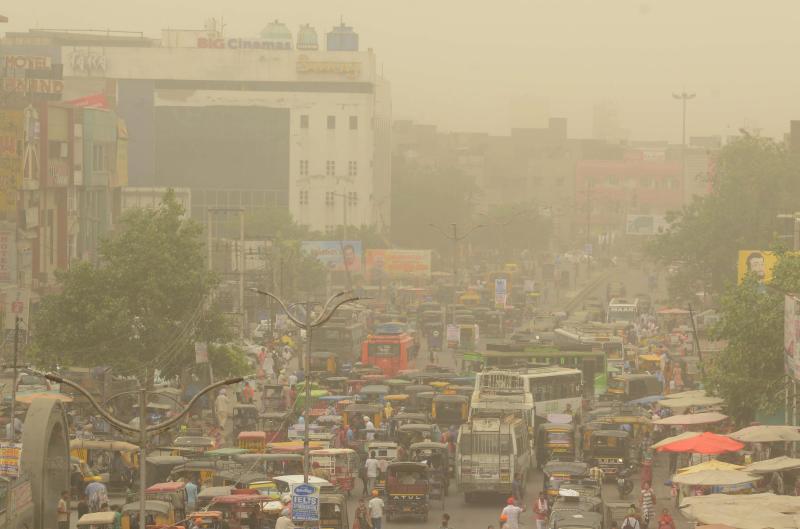Officials take emergency steps after pollution levels in India's capital hit three times above severe
Sign up now: Get insights on Asia's fast-moving developments

Commuters make their way as dust covers the sky at a bus stand in Amritsar on June 15, 2018.
PHOTO: AFP
Follow topic:
NEW DELHI - Pollution levels in India's capital remained more than two times above the severe level in what is the most polluted summer in recent years, forcing authorities to take emergency measures including shutting down all construction activities.
It had been hovering at more than three times the severe level for a number of days before it dipped on Friday (June 15) afternoon, but air quality remained in the 'severe' category.
Levels of PM10, or coarse dust particulate matter less than 10 micrometres in diameter, rose to 1,500 micrograms per cubic m on average over the past two days in Delhi and its satellite cities of Gurugram and Noida. The severe level starts at 430 micrograms per cubic m.
Meteorologists said dust storms in nearby desert areas had brought dust particles into Delhi. Combined with the existing pollutants in the air, this resulted in smog-like conditions and a deterioration in the air quality.
"It is unusual for it to be so severe during the summer months. PM2.5 levels normally go up during winter.
"Right now, coarser particles are present, causing the air quality to go to severe. This time, the average was 1,500 micrograms per cubic m. We haven't seen this in the last eight years at least," said Dr Gufran Beig, chief scientist at India's state-run System of Air Quality Weather Forecasting and Research, which comes under the Ministry of Earth Sciences.
The authorities have implemented emergency measures, even ordering the sprinkling of water on different roads to settle the dust and keeping a strict vigil on the burning of municipal waste.
There was also an increase in the use of machinery to clean the roads, and construction activities have been ordered to stop until Sunday.
The Indian MeteorologicalDepartmenthas predicted improved air quality by Saturday. By Friday afternoon, pollution levels had come down but they were still registering at two times over the severe limit.
Once the world's most polluted city, Delhi remains on the World Health Organisation's list of cities struggling to cope with pollution.
The city has a population of 16 million people and over 10 million vehicles with many households owning multiple cars.
Constant construction works around Delhi, a preference for diesel cars and the burning of crop stubble by farmers in nearby areas, have all contributed to the deteriorating air quality. This has resulted in pollution levels doubling over the last decade.
As a result, the federal and state governments have introduced a raft of measures at different times.
One initiative involved restricting cars with registration plates that end in odd numbers to plying the roads on odd days, and those with plates that end in even numbers to run on even days. An expressway was also built to divert trucks and other vehicles from the city.
Authorities are also in the process of setting up an early warning system so that appropriate measures can be taken when pollution levels go up.
But more needs to be done, experts say.
"We need massive dust control measures starting from very strict control over construction activities to massive greening efforts. We need to create a green wall to create a dust barrier.
"Dust in its pristine form is a respiratory irritant. But by the time dust enters the urban environment, it is coated in toxic elements and you end up inhaling all this toxic material," said Ms Anumita Roychowdhury, executive director at the Centre for Science and Environment.
With Delhi and its satellite cities recording regular spikes in pollution levels, the public has been piling on the pressure to get the government to do more.
"Pressure is building up and it has at least led to concrete action plans (like the early warning system), but not in terms of scale and stringency," added Ms Roychowdhury.
With pollution levels remaining above the severe level, the authorities have asked residents to remain indoors as much as possible.
But residents are frustrated, often venting their anger on social media.
Army veteran Ashok Kumar Singh, a former Colonel, said his health has been affected and he now suffers from respiratory problems.
"Pollution can't be resolved overnight. You need to have a 10- to 15-year plan. That plan is not there," said Mr Singh.
"After settling down here, I have become sick. I was a fit guy in the army and took part in military operations.
"The enemy couldn't kill me but pollution is."

